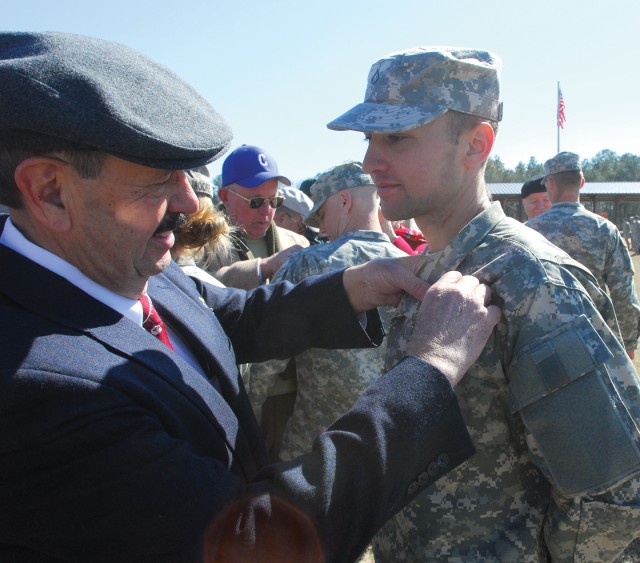Pvt. 1st Class Christopher Mullen grew up with "about a million" Airborne stories. When he graduated from Airborne School Friday, he reminisced about some of the anecdotes his grandfather, Darrell Branstetter, a former Fort Benning paratrooper, told him when he was younger.
Knowing the paratrooper history in his family made him proud, Mullen said.
"It was encouraging ... gave me something to live up to," said the 22-year-old Soldier, who enlisted in September, "looking for a challenge."
The real challenge of being a paratrooper lies in "the moments before the jump," he said. "It tests your courage. It's a confidence builder. You feel like you can do more."
Branstetter said he was certain his grandson would excel in the military.
"I'm very proud of him," he said. "He's a quality person. I believe that one of these days after he completes all this training, he will be a good candidate to become an officer."
The keynote speaker for the graduation, Branstetter earned his wings in 1950. He joined the Army while still in college, responding to a plea from President Harry Truman.
"He said we had serious problems with the communists in Korea, and it was a threat to our nation, and we needed to defend the spread of communism wherever it was in the world," he said. "I decided that it was a patriotic duty that I should put myself in a position to help defend this country."
Branstetter enlisted exactly 30 days after Truman's speech, a waiting period imposed by his father who wanted him to finish school.
Stationed with the 11th Airborne Division at Fort Campbell, Ky., Branstetter was not happy to still be stateside.
"I wanted to be a paratrooper and get into combat," he said. "I volunteered to go to Korea. Well, then they sent me to Fort Benning."
At Fort Benning, Branstetter served as an Airborne instructor, rigger and jumpmaster but never as a deployed Soldier. He recalls winning a spot jump contest May 15, 1952. His prize' "A three-day pass and $10 bill," he said.
As a civilian, Branstetter stayed active with sky diving, a more comfortable hobby than the combat jump training from World War II planes, where each jump was a "shock," he said. "Especially those old C46s and C47s ... you would feel the wind. It would wrinkle the skin on your face. (But) to me, it's enjoyable. I'd jump today if the Army would let me."
Over the years, much has stayed the same in the Airborne world, Branstetter said, although the pay has increased from the monthly $62.50 he remembers. Fort Benning is still teaching a diverse group of servicemembers, and paratroopers still go through a rigorous training program.
"I think the paratrooper stands out in the military as having accomplished training for combat that no other unit in the military has," he said. "These people are willing to risk their lives in jumping and exposing themselves to enemy fire as they descend from an aircraft in flight to confront the enemy. It takes a lot of discipline to follow through with the training they've been given at Airborne School."
Branstetter said he feels confident Mullen has that discipline, which will carry him through his next assignments, including special forces training and a possible deployment to Afghanistan.
Although Branstetter has pinned thousands of Airborne graduates during his time in the Army, pinning his grandson was a "highlight," he said.
"It gives you a sense that you have instilled in your children and grandchildren a patriotic need to defend this country," he said. "Very few people have a grandson who follows in their footsteps. It makes you feel special."


Social Sharing